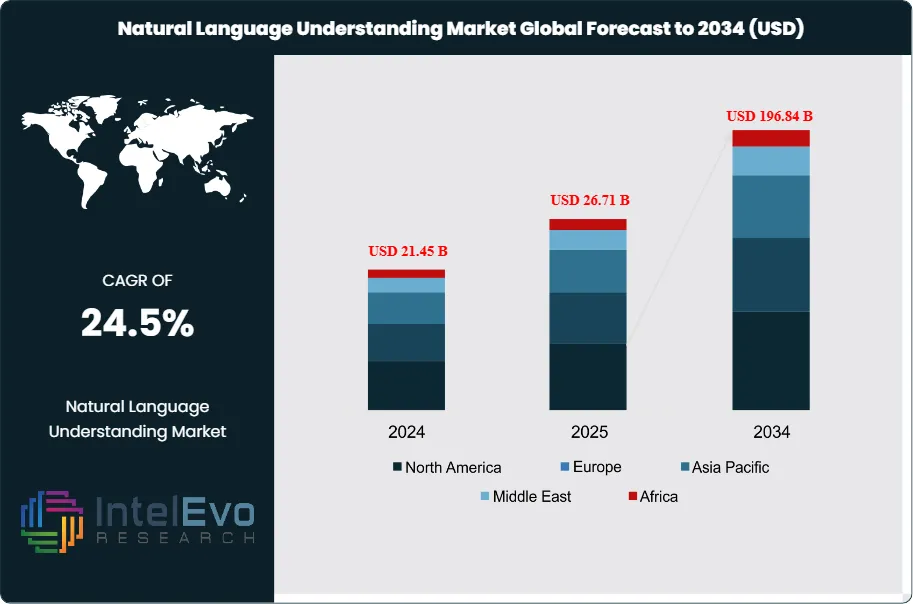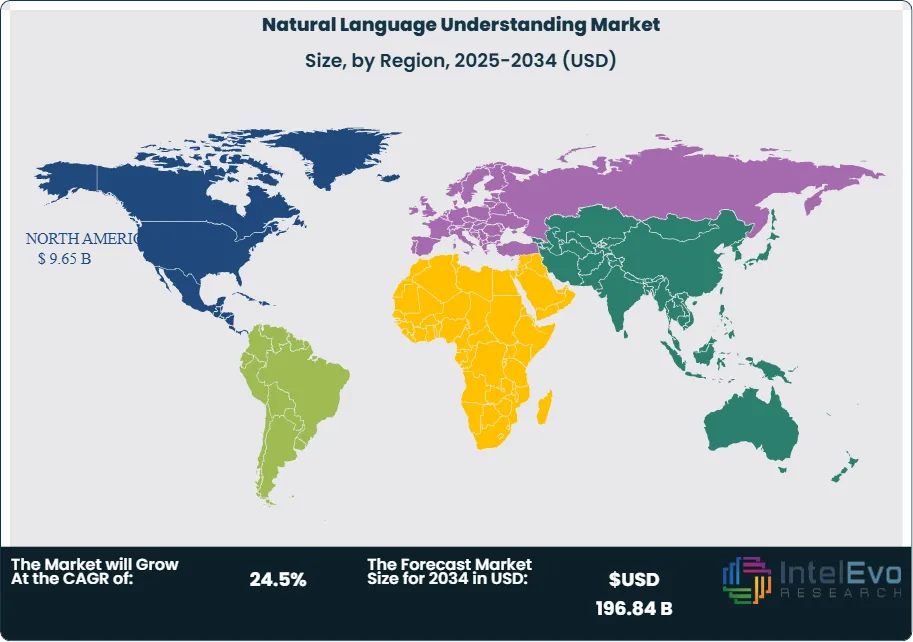
Natural Language Understanding Market Size & Forecast 2034 | 24.5% CAGR
Global Natural Language Understanding Market Size, Share, Analysis Report Component(Service, Software - leads), Application(Text and Voice Processing, Information Extraction. Automatic Summarization, Chatbots - leads, Voice-First Technologies, Machine Translation), Organization Size(Large Size Organizations - leads, Small and Medium Size Organizations), Industry Vertical(BFSI - leads, Healthcare, Manufacturing, Retail and E-commerce, Education, Other Industry Vertical), Region and Key Players - Industry Segment Overview, Market Dynamics, Competitive Strategies, Trends and Forecast 2025-2034
Report Overview:
The Natural Language Understanding (NLU) Market size is projected to reach approximately USD 196.84 Billion by 2034, up from USD 21.45 Billion in 2024, growing at a CAGR of 24.5% during the forecast period from 2025 to 2034. The rapid growth of NLU technology is being driven by the widespread adoption of AI-powered virtual assistants, chatbots, and voice recognition systems across industries such as healthcare, BFSI, e-commerce, and IT services. As businesses increasingly focus on personalized customer interactions and intelligent automation, NLU is emerging as a critical enabler of next-generation communication systems. The integration of generative AI and multimodal LLMs into NLU platforms is expected to redefine how machines interpret and respond to human language, unlocking new frontiers in real-time analytics and cognitive computing.
Get More Information about this report -
Request Free Sample ReportNatural Language Understanding (NLU) is a subfield of artificial intelligence (AI) that focuses on machine reading comprehension, enabling machines to understand and interpret human language in both written and spoken formats. The growing digital transformation across industries and the increasing use of smart devices are driving the demand for NLU technologies. Organizations are deploying NLU systems for applications such as chatbots, voice-activated systems, sentiment analysis, and document summarization. The market is also being bolstered by advances in deep learning and the growing availability of big data, which are making NLU more effective and accessible.
The market is significantly influenced by factors such as increasing adoption of AI across industries, rising investments in AI technologies, and the emergence of voice-first technologies. Moreover, the increasing focus on customer engagement and automation in business processes contributes to the expanding use of NLU solutions. However, challenges such as linguistic ambiguity and the high cost of implementation restrain the market to some extent.
North America leads the NLU market, driven by strong technology adoption, presence of tech giants, and extensive R&D investments. The U.S., in particular, is home to major NLU solution providers like Google, Microsoft, and Amazon. Europe is following closely, while the Asia-Pacific region is expected to witness the highest growth due to digitalization efforts and growing AI initiatives in countries like China, India, and Japan.
The COVID-19 pandemic has accelerated the adoption of digital technologies, including AI and NLU. With the surge in remote work and increased reliance on digital platforms for communication, enterprises have leveraged chatbots and automated assistants to enhance customer service. Additionally, the pandemic has emphasized the importance of AI in healthcare and e-commerce, two sectors that have increasingly adopted NLU for efficient data analysis and interaction.

Key Takeaways:
- Market Growth: The Natural Language Understanding Market is expected to reach USD 196.84 Billion by 2034, due to the rising integration of AI across sectors and increasing demand for intelligent automation.
- Component Dominance: Software dominates the market as it forms the core of NLU applications, especially in industries adopting automation and AI-powered customer engagement tools.
- Application Dominance: Chatbots lead the application segment, primarily due to their use in customer support, reducing human workload and improving service efficiency.
- Organization Size Dominance: Large enterprises dominate this segment as they have the financial capacity and digital infrastructure to integrate NLU solutions at scale.
- Industry Vertical Dominance: The BFSI sector leads in NLU adoption owing to its need for real-time customer interaction, fraud detection, and compliance monitoring.
- Driver: The increasing use of digital assistants and the rise in customer-centric services are propelling the market.
- Restraint: High implementation costs and complexities related to multilingual understanding hinder widespread adoption.
- Opportunity: Expanding application areas in healthcare and education offer substantial growth prospects.
- Trend: The rise of voice-first technologies and integration of NLU with IoT devices is shaping the future landscape.
- Regional Analysis: North America remains the leader due to robust digital infrastructure, while Asia-Pacific is anticipated to grow rapidly driven by government-led AI initiatives.
Component Analysis:
Software Leads With more than 70% Market Share In Natural Language Understanding Market. The software component leads the NLU market owing to its essential role in enabling applications like chatbots, virtual assistants, and sentiment analysis tools. Software solutions are highly scalable and offer customization, which makes them more suitable for enterprises seeking to automate communication and customer interaction. The growing SaaS-based model for NLU software is also driving adoption, as it lowers initial costs and facilitates easier integration. With advances in natural language processing and machine learning, software tools are now more accurate and context-aware, enabling richer user experiences.
Application Analysis:
Chatbots represent the most prominent application segment within the NLU market. Businesses across industries deploy chatbots to handle customer service inquiries, lead generation, and internal HR functions. These bots, powered by NLU, understand and respond to user queries in real-time, offering 24/7 support. The adoption is particularly high in the retail, banking, and telecom sectors, where customer interaction volumes are high. Chatbots not only improve operational efficiency but also enhance user satisfaction by delivering personalized, context-relevant responses.
Organization Size Analysis:
Large enterprises dominate NLU adoption due to their greater capacity for digital transformation. They possess the necessary infrastructure and capital to invest in advanced AI and NLU systems. These organizations typically deal with vast volumes of unstructured data that require sophisticated tools for analysis and understanding. As a result, they are early adopters of NLU for customer service automation, predictive analytics, and enterprise communication tools. Moreover, large enterprises often operate globally, necessitating multilingual support an area where NLU excels.
Industry Vertical Analysis:
BFSI Leads With nearly 30% Market Share In Natural Language Understanding Market. The BFSI (Banking, Financial Services, and Insurance) sector is a leading adopter of NLU technologies. The industry requires accurate and real-time information processing for customer support, fraud detection, and regulatory compliance. NLU enables institutions to automate customer interactions through virtual assistants, thereby reducing wait times and operational costs. Additionally, sentiment analysis tools help financial firms understand customer behavior and tailor services accordingly. The emphasis on security and data analysis in BFSI ensures continued investment in NLU solutions.
Region Analysis:
North America Leads With over 45% Market Share In Natural Language Understanding Market. North America holds the dominant share in the global NLU market, led by the United States. The region's leadership can be attributed to the presence of major technology providers such as Google, Microsoft, IBM, Amazon, and OpenAI. These companies are at the forefront of developing and deploying cutting-edge NLU solutions. Moreover, high digital literacy, robust cloud infrastructure, and substantial investments in AI research further bolster the market.
Europe ranks second, with significant contributions from countries like Germany, the U.K., and France. The region is seeing growing demand for NLU in sectors like finance, healthcare, and public administration. The Asia-Pacific region is the fastest-growing market, fueled by the digitalization efforts of governments and enterprises in China, Japan, South Korea, and India. These nations are witnessing increased deployment of chatbots, voice-enabled systems, and translation tools.
In terms of future growth, sectors like healthcare and education in Asia-Pacific and Latin America are expected to see significant adoption of NLU solutions. The use of NLU in local languages and for mobile-based platforms will be key to this expansion.

Get More Information about this report -
Request Free Sample ReportKey Market Segment:
By Component
- Software
- Services
- Consulting
- Integration & Deployment
- Support & Maintenance
By Technology
- Machine Learning (ML) and Deep Learning
- Rule-Based Systems
- Hybrid Approaches
- Generative AI and Transformer-Based Models (LLMs)
By Deployment Mode
- On-Premise
- Cloud-Based
- Hybrid
By Organization Size
- Large Size Organizations - leads
- Small and Medium Size Organizations
By Application
- Chatbots and Virtual Assistants
- Voice Recognition Systems
- Customer Experience Management
- Text and Sentiment Analysis
- Information Retrieval
- Fraud Detection and Compliance
- Translation and Multilingual Communication
- Others (Legal Tech, Content Moderation, etc.)
By End-Use Industry
- BFSI
- Healthcare
- Retail & E-commerce
- IT & Telecommunications
- Automotive
- Media & Entertainment
- Education
- Manufacturing
- Government & Public Sector
- Others (Travel, Legal, Logistics, etc.)
By Region
- North America
- Latin America
- East Asia And Pacific
- Sea And South Asia
- Eastern Europe
- Western Europe
- Middle East & Africa
| Report Attribute | Details |
| Market size (2025) | USD 26.71 B |
| Forecast Revenue (2034) | USD 196.84 B |
| CAGR (2025-2034) | 24.5% |
| Historical data | 2018-2023 |
| Base Year For Estimation | 2024 |
| Forecast Period | 2025-2034 |
| Report coverage | Revenue Forecast, Competitive Landscape, Market Dynamics, Growth Factors, Trends and Recent Developments |
| Segments covered | By Component (Software, Services), By Technology (Machine Learning (ML) and Deep Learning, Rule-Based Systems, Hybrid Approaches, Generative AI and Transformer-Based Models (LLMs)), By Deployment Mode (On-Premise, Cloud-Based, Hybrid), By Organization Size (Large Size Organizations - leads, Small and Medium Size Organizations), By Application (Chatbots and Virtual Assistants, Voice Recognition Systems, Customer Experience Management, Text and Sentiment Analysis, Information Retrieval, Fraud Detection and Compliance, Translation and Multilingual Communication, Others), By End-Use Industry (BFSI, Healthcare, Retail & E-commerce, IT & Telecommunications, Automotive, Media & Entertainment, Education, Manufacturing, Government & Public Sector, Others) |
| Research Methodology |
|
| Regional scope |
|
| Competitive Landscape | Google LLC, Microsoft, International Business Machines Corporation, Amazon.com Inc., Salesforce Inc., NVIDIA Corporation, OpenAI, SAP SE, Nuance Communications, Hugging Face Inc., Idiap, The Aspect NLU Lab, SAS, Oracle |
| Customization Scope | Customization for segments, region/country-level will be provided. Moreover, additional customization can be done based on the requirements. |
| Pricing and Purchase Options | Avail customized purchase options to meet your exact research needs. We have three licenses to opt for: Single User License, Multi-User License (Up to 5 Users), Corporate Use License (Unlimited User and Printable PDF). |
Select Licence Type
Connect with our sales team
Natural Language Understanding Market
Published Date : 04 Jul 2025 | Formats :Why IntelEvoResearch
100%
Customer
Satisfaction
24x7+
Availability - we are always
there when you need us
200+
Fortune 50 Companies trust
IntelEvoResearch
80%
of our reports are exclusive
and first in the industry
100%
more data
and analysis
1000+
reports published
till date







